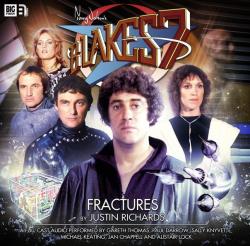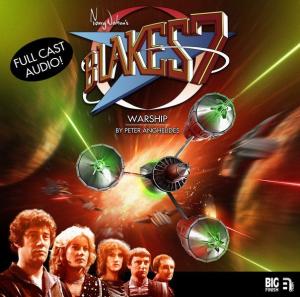Blake's 7 - The Classic Audio Adventures: Vol 1.1 – Fractures
Saturday, 1 March 2014 - Reviewed by

Blake's 7 - The Classic Audio Adventures: Vol 1.1 - Fractures
Writer: Justin Richards
Director: Ken Bentley
Producer: Big Finish
Released: January 2014
Vila Restal babbles - Blake's 7: Fractures
Regardless of what your favourite TV programme is - eg, Doctor Who, Arrow, Game of Thrones or The Walking Dead - you know that each new season opens with all barrels blazing from the get-go. It's a time-honoured tactic among TV series that's vital to rebuilding the audience after months off-screen. Once the viewers are hooked, the TV programme can afford to be more experimental with later episodes, slowing down the pace, injecting romance or contemplation, or creating an atmosphere of the claustrophobic or psychological. 2012's Asylum of the Daleks, for example, was Doctor Who's answer to delivering a season-opener with impact; it would have been a risk to have started with The Power of Three.
Even Big Finish is no stranger to this philosophy, as it's shown time and again with many of its mini-trilogies of Doctor Who tales with specific Doctor/companion combinations. So it's surprising that for its first full season of eight full-cast Blake's 7 audio dramas, it has opted for something more like a "mid-season" episode than an adrenaline-fuelled, fist-pumping opener.
Fractures, written by veteran Doctor Who and B7 scribe Justin Richards, marks (in the author's own words) the start of the "extension" to the second season of the Blake's 7 TV series (first broadcast in 1979). Unfortunately, he also seems to have treated this "season within a season" approach too literally. Richards has delivered a story that perhaps could plausibly have been a mid-season episode in B7's second series - but it certainly isn't a story that (to this B7 fan's mind) would have been a worthy one even if it had been produced for the TV series back in the day, and certainly not as a curtain-raiser.
The story starts with an exciting prologue that puts Blake (Gareth Thomas) and the Liberator crew in a stand-off with five Federation pursuit ships commandeered by Space Commander Travis (Brian Croucher). It's the kind of pulsating confrontation that you would expect of a new series-opener and brings back fond memories of early B7 episodes such as Duel that saw a similar confrontation on-screen (albeit with Travis being played by Stephen Greif). In yet another nod to the TV series, the preface even ends with Travis repeating his vow to hunt down Blake to the very end (Croucher recites a speech made more famous by Greif in the character's first episode Seek Locate Destroy).
To escape Travis's grasp, the Liberator retreats to a region of space that is off limits to Federation ships and littered with derelict spacecraft. It is from this point that the proper story begins. The Liberator is suddenly struck by what appears to be a systems crash and members of the crew are inevitably separated and trapped in different sections of the ship. It soon becomes clear that the Liberator has been incapacitated and that one of the crew may be responsible.
In the events that follow, Richards aspires to create a tense psychological mystery. This is achieved through ongoing dialogue between the regular cast members (and no other guest stars) to create suspicion and suspense. Richards has always been adept at making sound an important narrative device in his audio stories (his early Doctor Who serial Whispers of Terror is a great example) and with Fractures he makes the immediacy of the aural experience - with the characters talking to each other across the Liberator's communications channel - critical to the story. Although it becomes patently obvious the longer the story goes on that the Liberator crew are being manipulated, the cast all deliver believable and occasionally intense performances. Furthermore, the actors reprise their roles again as effortlessly as if they've never left them. Thomas is steadfast as Blake, Sally Knyvette cool and calm as Jenna, Jan Chappell inquisitive as Cally, Paul Darrow sardonic and dry as Avon and Michael Keating's Vila as nervously comical as ever.
Unfortunately, the central premise and climax of the story is as clichéd as some of B7's least popular episodes. As a TV series, B7 is most fondly remembered for its epic political and dystopian commentary on the future, not for its occasional and less successful forays into pure or hard science fiction. Fractures unfortunately belongs to the latter, although it would be grossly unfair to say it is as diabolical as The Web, Trial, Sarcophagus or Ultraworld - TV episodes that were endlessly derided by fans for being poorly written and unsuccessfully realised on screen. Nevertheless, the threat in this serial proves to be very generic and rather unimaginative and could belong just as easily in a Doctor Who serial or a Star Trek episode as a B7 one.
The serial ends with the Liberator crew learning information that has ramifications for the next seven instalments of this audio series. To me, this reinforces why Fractures is a weak and disappointing start to what may otherwise be an enthralling and tense saga. Perhaps this episode should have appeared in the middle of this run - certainly, if it had been part of B7's original television run, it would have been a mid-season episode and a forgettable one at that, with little relevance to the overall story arc. Let's hope the next instalment - the dramatic-sounding Battleground – is a major improvement.







